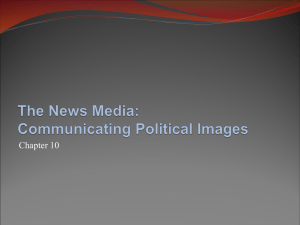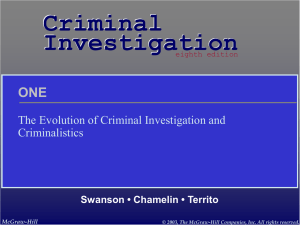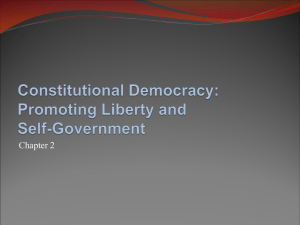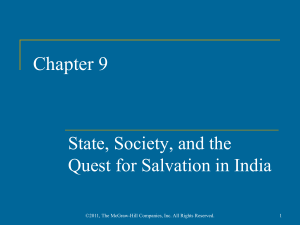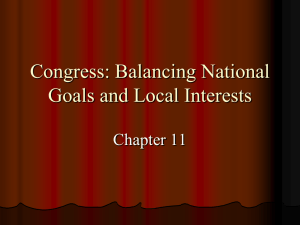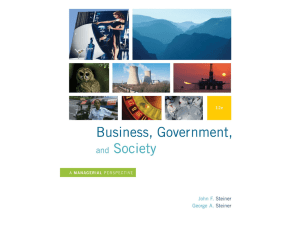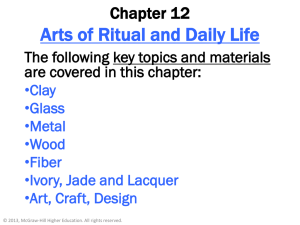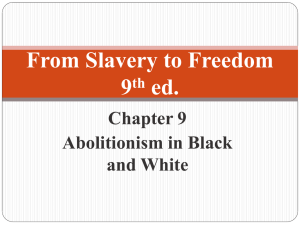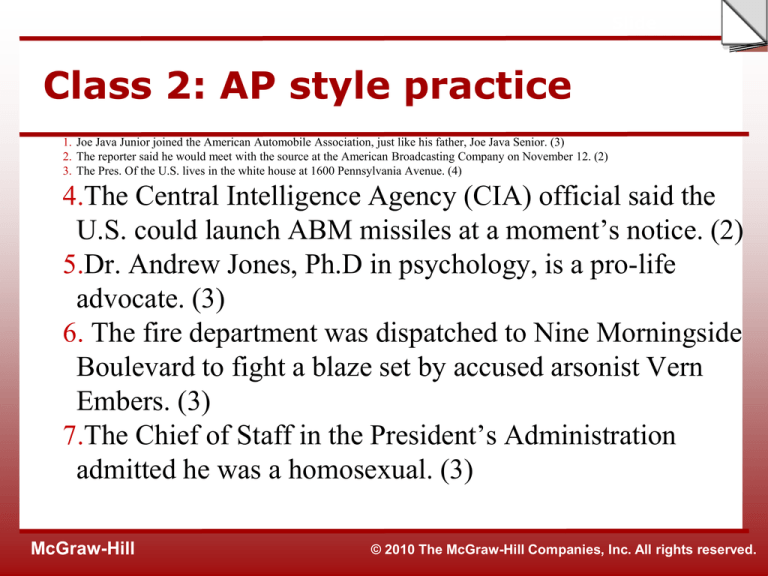
Slide
Class 2: AP style practice
1. Joe Java Junior joined the American Automobile Association, just like his father, Joe Java Senior. (3)
2. The reporter said he would meet with the source at the American Broadcasting Company on November 12. (2)
3. The Pres. Of the U.S. lives in the white house at 1600 Pennsylvania Avenue. (4)
4.The Central Intelligence Agency (CIA) official said the
U.S. could launch ABM missiles at a moment’s notice. (2)
5.Dr. Andrew Jones, Ph.D in psychology, is a pro-life
advocate. (3)
6. The fire department was dispatched to Nine Morningside
Boulevard to fight a blaze set by accused arsonist Vern
Embers. (3)
7.The Chief of Staff in the President’s Administration
admitted he was a homosexual. (3)
McGraw-Hill
© 2010 The McGraw-Hill Companies, Inc. All rights reserved.
Slide
Class 2: AP style practice
answers
1. Joe Java Junior joined the American Automobile Association, just like his father, Joe Java Senior. (3)
2. The reporter said he would meet with the source at the American Broadcasting Company on November 12. (2)
3. The Pres. Of the U.S. lives in the white house at 1600 Pennsylvania Avenue. (4)
4.The CIA official said the United States could launch
ABMs at a moment’s notice.
5.Andrew Jones, doctorate in psychology, is an antiabortion advocate.
6. The fire department was dispatched to 9 Morningside
Blvd. to fight a blaze.
7.The chief of staff in the president’s administration said
he was a homosexual.
McGraw-Hill
© 2010 The McGraw-Hill Companies, Inc. All rights reserved.
Slide
Beat Story #1 feedback
Refer to page 59
Lead;Nut graph or second paragraph
Check for personal pronouns, passive
voice, grammar and punctuation
problems.
Attribution and Quotes
Check for accuracy, fairness and balance,
redundancy, cliches etc.
AP stylebook
McGraw-Hill
© 2010 The McGraw-Hill Companies, Inc. All rights reserved.
Slide
Beat Story #2 feedback
Tighten lead;Nut graph
Check for personal pronouns, passive
voice, grammar and punctuation
problems.
Attribution and Quotes
Check for accuracy, fairness and balance,
redundancy, cliches etc.
AP stylebook
Example
McGraw-Hill
© 2010 The McGraw-Hill Companies, Inc. All rights reserved.
lcome to the world of
Every culture seeks effective
constantly evolving, reflectingdramatically. The typi
urnalism, where
ways to spread new
and shaping its culture.
newspaper of 1800 wa
porters have been
information and gossip. In
Others see it as an inspiring undisciplined mishma
gging dirt, raking muck, ancient times, news was
quest for free speech, an
legislative proceeding
king headlines and adlines written on clay tablets. In
endless power struggle
long-winded essays a
for centuries
Caesar’s age, Romans read
between Authority (trying to secondhand gossip. B
w. It’s a history full of
newsletters compiled by
control information) and the 1900, a new breed of
bloid trash, of slimy
correspondents and
People (trying to learn the
tor had emerged. Jour
nsationalists, of runkards, handwritten by slaves.
truth). Which brings to mind had become big busin
deadbeats and mmers” (as Wandering minstrels spread
the words of A.J. Liefling:
Reporting was becom
a Harvard iversity
news (and the plague) in the
“Freedom of the press is
disciplined craft. And
president once scribed
Middle Ages. Them came ink guaranteed only to htose who newspapers were bec
Tim Harrower
reporters).
on paper. Voices on airwaves.
own one.”
more entertaining and esse
But it’s a history full of Newsreels, Web sites, And 24- In the pages ahead, we’ll takethan ever, w
roes, too: men and
hour cable news networks.
a quick tour of 600 years of most of the features w exp
men risking their lives tell Thus when scholars analyze journalism history, from
today: Snappy headlines, A
stories of war and agedy, the rich history of journalism, hieroglyphics to hypertext: the Comic Sports pages. And
risking prisonment to
some view it in terms of
media, the message and the “inverted pyramid” sty wr
defend
technological progress—for
politics.
that made stori tighter and
ee speech. And as you
example, the dramatic impact
Technical advances and
newsier.
n see here, reports have of bigger, faster printing
brilliant ideas forged a new
Radio and television br
come beloved characters ppresses.
style of journalism. It was a an end to
culture, too, turning up
Others see journalism as a century of change, and
newspapers’ media monop
movies, comics and TV specialized form literary
newspapers changed
Why? Well yourself: Whic
ows as if guided by an cult expression, one that’s
did yo
hand.
Inside Reporting
6
Beyond breaking news
McGraw-Hill
© 2010 The McGraw-Hill Companies, Inc. All rights reserved.
Slide
Beyond breaking news
The world of features
Generating story ideas
Feature style
Feature story structures
Writing profiles
Enterprise projects
(continued)
McGraw-Hill
© 2010 The McGraw-Hill Companies, Inc. All rights reserved.
Slide
Beyond breaking news
(continued)
Investigative reporting
Package planning
Short-form alternatives
Writing editorials and columns
Writing reviews
McGraw-Hill
© 2010 The McGraw-Hill Companies, Inc. All rights reserved.
Slide
The world of features
Personalizing the
news with stories
Features explore a
variety of topics
News stories focus on •Lifestyles
timely, public events. •Health
•Science and technology
Features are more
personal.
•Entertainment
•Include topics,
•Food
treatments, styles
•Homes
and
gardens
not found in news.
McGraw-Hill
© 2010 The McGraw-Hill Companies, Inc. All rights reserved.
Slide
The world of features
10 Popular feature stories
Personality profile
Reaction piece
Human-interest
story
Flashback
Color story
Consumer guide
Backgrounder
Personal narrative
How-to
Trend story
McGraw-Hill
© 2010 The McGraw-Hill Companies, Inc. All rights reserved.
Slide
Generating story ideas
“Hard” news, “soft” news
Relative terms that describe
topic and treatment of story.
• Expect serious, timely events
to be written in invertedpyramid style.
• Items that are less urgent or
somber make up “soft” news.
McGraw-Hill
© 2010 The McGraw-Hill Companies, Inc. All rights reserved.
Slide
Generating story ideas
Great stories are waiting discovery
TV, magazines, newspapers,
Web sites
Brainstorming
McGraw-Hill
© 2010 The McGraw-Hill Companies, Inc. All rights reserved.
Slide
Generating story ideas
Is it a good one?
Where did it come
from?
Is it original?
Did it surprise you?
Does the idea have
movement?
McGraw-Hill
Is there a STORY there?
Is there tension?
Is it true?
Do you like the story?
© 2010 The McGraw-Hill Companies, Inc. All rights reserved.
Slide
Generating story ideas
Turn your idea into a story
See if it’s been done.
Focus your angle.
Do your research.
Write the story.
McGraw-Hill
© 2010 The McGraw-Hill Companies, Inc. All rights reserved.
Slide
Feature style
Some stories require a livelier,
looser, more literary voice
Tom Wolfe dubbed it “New
Journalism.”
• Realistic dialogue.
• Vivid reconstruction
of scenes.
McGraw-Hill
•Viewed through the eyes
of the characters.
•Recording everyday
details.
© 2010 The McGraw-Hill Companies, Inc. All rights reserved.
Slide
Feature style
Successful feature writers rely on
literary techniques
Syntax & phrasing
Voice & tense
Detail & description
Dramatic techniques
McGraw-Hill
© 2010 The McGraw-Hill Companies, Inc. All rights reserved.
Slide
Feature style
Successful feature writers…
Helpful tips
• Write tightly.
•Stay objective.
• Vary sentence
structure.
•Read.
• Match treatment to
topic.
• Don’t overdo.
• Avoid 1st person.
McGraw-Hill
© 2010 The McGraw-Hill Companies, Inc. All rights reserved.
Slide
Feature story structures
Standard story structures
How long should this
story be?
What key points do I
need to make?
Think visually.
McGraw-Hill
© 2010 The McGraw-Hill Companies, Inc. All rights reserved.
Slide
Writing profiles
Good profiles reveal feelings,
attitudes, habits and mannerisms
How to research and
write successful profiles
• Solicit your subject’s support. •Follow up with
interviews and research.
• Interview and observe.
•Structure your story.
• Find your focus.
McGraw-Hill
© 2010 The McGraw-Hill Companies, Inc. All rights reserved.
Slide
Writing profiles
Sample story structures for profiles
Anecdotal lead
Scene #1
• Engaging, revealing small • Observe subject in action
story to lure readers in
using dialog, details,
descriptions
Nut graf
• Summarizes why this
person matters now
McGraw-Hill
Chronology
• Recap of subject’s past
© 2010 The McGraw-Hill Companies, Inc. All rights reserved.
Slide
Writing profiles
Sample story structures…
Scene #2
• Another look at the subject
in action
What lies ahead
• Plans, dreams, goals and
obstacles
Closing quote
McGraw-Hill
© 2010 The McGraw-Hill Companies, Inc. All rights reserved.
Slide
Writing profiles
3Ways to paint a better portrait
1. Capture details.
2. Re-create scenes.
3. Add quotes and
dialogue.
McGraw-Hill
© 2010 The McGraw-Hill Companies, Inc. All rights reserved.
Slide
Enterprise projects
Enterprise stories explore Why, How,
and What Happens Next
Finding the time
•Make lists.
•Prioritize.
•Devote time each day.
•Keep the project organized.
•Don’t overwork.
McGraw-Hill
© 2010 The McGraw-Hill Companies, Inc. All rights reserved.
Slide
Enterprise projects
Doing the reporting
Start with thesis.
Do your research.
Report. Report.
Report.
McGraw-Hill
Control the
material.
Look for universal
connections.
Keep a running list of
questions and things to
do.
© 2010 The McGraw-Hill Companies, Inc. All rights reserved.
Slide
Enterprise projects
Writing the story
Write from the first. Don’t be afraid of the
edit.
Write after each
interview.
Seek outside input.
Rewrite each time.
Enjoy the process.
Plan your ending.
Save often, print
frequently.
McGraw-Hill
© 2010 The McGraw-Hill Companies, Inc. All rights reserved.
Slide
Investigative reporting
Proud tradition may be in decline
•Investigation is the work
of the reporter.
•Subject involves
something of importance
to readers.
•Others are attempting to
hide these matters from
public.
McGraw-Hill
Digging up dirt
•Be skeptical…
•…but remain objective.
•Focus tightly.
•Cast a wide net.
•Keep your nose clean.
•Work the Web.
© 2010 The McGraw-Hill Companies, Inc. All rights reserved.
Slide
Short-form alternatives
To reach readers, condense the data
Fast-facts box
Bio box
Checklist
List
Step-by-step guide
McGraw-Hill
Quiz
Factual index
Diagram
Quote collection
Timeline
© 2010 The McGraw-Hill Companies, Inc. All rights reserved.
Slide
Writing editorials and columns
Editorials and columns provide
personality and passion to a paper
Editorial cartoon –
Editorial – usually
combines art and
from 300 to 500
words; comments on commentary of
current events
current events;
appears to express
Column – signed
the opinion of the
opinion
paper
McGraw-Hill
© 2010 The McGraw-Hill Companies, Inc. All rights reserved.
Slide
Writing editorials and columns
Columns: The options are endless
Topical commentary
Advice for columnists
•Reaction to
•Develop a distinctive voice.
events
•Do your own reporting.
Personal meditations
•Choose worthy topics.
•Personal life
•Avoid jumping on
Slice of life
bandwagons.
•Storyteller
•Always have a backup.
McGraw-Hill
© 2010 The McGraw-Hill Companies, Inc. All rights reserved.
Slide
Writing editorials and columns
How do readers recognize this story
is an opinion column?
Column logos
Different headline font
Initial cap
McGraw-Hill
© 2010 The McGraw-Hill Companies, Inc. All rights reserved.
Slide
Writing reviews
Readers depend on critics for advice
Criticism – study,
evaluation and
interpretation of the
arts
•For reader-friendly
reviews, create a fact
box.
McGraw-Hill
© 2010 The McGraw-Hill Companies, Inc. All rights reserved.
Slide
Writing reviews
How to write criticisms
Structure your
reviews.
Balance reporting and
opinion.
Know your stuff.
Be aware of biases.
Don’t be pompous.
Don’t be cruel.
McGraw-Hill
© 2010 The McGraw-Hill Companies, Inc. All rights reserved.
Group Work
Slide
Week 10 Assignments
Beat Story #2 final draft
Deadline: Tuesday, May 21 at 8 a.m.
Read Ch. 7
Class 1: Groups 1-4, 10
Class 2: Groups 3,6
McGraw-Hill
© 2010 The McGraw-Hill Companies, Inc. All rights reserved.

